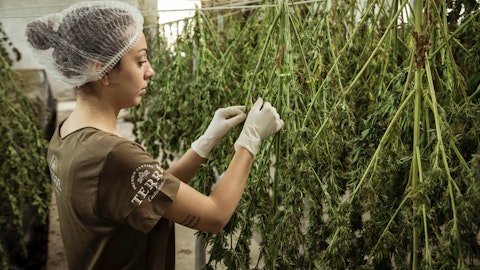But, there were stories up to 80% of cannabis companies out there were not paying their excise taxes on time, or in some cases not paying them at all. And what is new news, and we saw a little bit of this last year where, you know, the CRA went in to a couple of LPs last year, and couldn’t see any hope of getting their excise duties repaid, and closed them down. But what’s really the new news that, we started to hear at the start of this calendar year, is that the CRA has started to ask the provinces to garnish their payments to the LPs so that – for their amounts owing in arrears excise taxes. What this means is companies that were planning to leverage that money aren’t going to have that opportunity going forward. I think this is going to be the real change that we’re going to see in the next six to 12 months where that – with that cash not being available.
And of course, the boards aren’t happy about having to do this work and might even choose to stop ordering as much from those LPs. I think this is going to be the dynamic change that, accelerates that shakeout. I mean, we all talked about the fact that it needs to happen. We’re too fragmented an industry. We’re proud to be the number two LP, but with 7.3% market share at the end of December, it’s still a very small market share, compared to what a normal mature category would have. So this is necessary, and we do think it’s coming.
Aaron Grey: Thank you. Really helpful color there on your view of the market. So really appreciate it. I’ll jump back in the queue.
Beena Goldenberg: Thank you.
Operator: Your next question comes from the line of Federico Gomes from ATB Capital Markets. Please go ahead.
Federico Gomes: Hi, good morning. Thank you for taking my questions. My first question is just on your first shipment to Germany. I’m just curious about your expectations for that market, given the potential votes happening soon there in terms of legalization. And also in terms of your EU GMP certification, can you just maybe provide a little bit more color on exactly how does that impact your international exports? Thank you.
Beena Goldenberg: Sure. So first about our German shipment. So, we had announced the agreement with the Sanity Group a while ago. And as we work through the appropriate stability testing and regulatory requirements, we’re excited that we finally got our first shipment out into the German market. And as you said, with the recent ruling that they’re going to remove cannabis from the narcotics identified as a narcotic, it will open up the medical market. It’s anticipated on the conservative side that, the medical market will grow two to three times this year. So, we’re very excited about the opportunity to increase our shipments, to our partner now in Germany. And so yes, Germany might not be as exciting as it was about a year ago, when everybody thought – that was coming.
But, just like Canada evolves, we’re going to get into a growing medical market first. And they’re testing pilot facilities and pilots on rec and we’ll see where that goes. But we’re still very interested in the German market, as a result of that. And then your second question around our EU GMP certification. So, we have gone through the work to get ourselves ready for the audit. How it works with an EU GMP certification is you have to get somebody over from a European jurisdiction to come in and do the audit. So it’s a little bit difficult to confirm exactly, when that will be scheduled. But we’ve done our homework. We believe we’re audit ready and are just waiting for that auditor to come over. What this will mean to us once we get certified is that instead of having to move our GACP flower through a facility such as in Portugal, or one of these converters who would then package it up and available for an European market, we’d be able to ship directly.
In the case of Australia, having GMP would allow us to package our product and ship it to Australia rather than selling bulk product. And in both of these cases, it would be higher margin business for us, without requiring a middleman touching the product. So, we’re very excited about opening up more markets available to us, with the EU GMP and the ability to take out the middleman by shipping direct.
Federico Gomes: Thank you for the color. That’s great. Thank you, Beena. So my next question is just, I think the U.S. market, you have always said that you’re looking at it and you think it’s a potential long-term opportunity. We recently saw a competitor of yours that appears to be approaching a structure that, would be compliant with the NASDAQ, to get no plant-touching exposure there. I’m just curious, if you would consider pursuing something similar? How do you look at it, given that you’re also a NASDAQ listed? Thank you.
Beena Goldenberg: Yes, thanks, Fred. So first of all, we did our first investment in the U.S. last year in May when we invested in Phylos Bioscience. And so, we did take some time to figure out how to set up the structure in a way that would be obviously compliant with our NASDAQ and TSX listings. And at the same time, have some benefit to our organization. And that’s where we were able to access the high concentration of THCV flower, as well as the seeds to allow us to move into seed-based production. So it was an investment in the U.S. And although you can’t consolidate – there was benefit to our existing business. So, we will look at the U.S. for sure with Project Jupiter, as well as other emerging markets, but the U.S. will be a focus.




